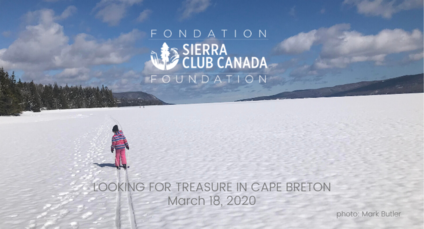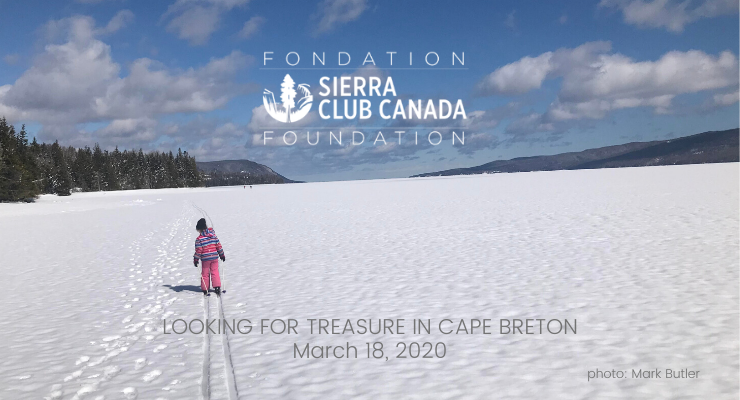
Like many families, my own is now in semi-isolation, with daycares, schools, and extracurricular activities cancelled for the next few weeks. We want to do our part, as Dr. Theresa Tam, Canada's Public Health Officer and other health officials across the country are asking us to do.
And like many people, I have relatives and friends who are being called into action as never before, either as healthcare workers or public servants responsible for emergency response. Others are part of keeping our food systems working. I am so grateful for their courage, energy, and creativity, but I also worry for them.
As a member and supporter of Sierra Club Canada Foundation, you are used to thinking about crises on large and small scales: preventing the loss ofirreplaceable habitat, threats to unique and wondrous species, and pushing for greater action on the part of our government to stop climate change and tackle the loss of plants and animals that make up the fabric of life. But I think COVID-19 is bringing all of us to new ways of thinking about ourselves and our societies.
What can we learn as we experience this crisis unfold, impacting us all?
1. Governments can work together, and they need to.
On a long drive from what may be my last face-to-face meeting for the next little while, I heard Opposition Leader Andrew Scheer express his condolences to Prime Minister Trudeau's family, and, in particular, to the Prime Minister’s wife Sophie Grégoire Trudeau, who had contracted the COVID-19 virus. Even the bitter tension with western provinces, particularly Alberta, has lessened somewhat, as Premier Kenney himself called on the federal government to help his province hit with the double whammy of COVID-19 and tanking oil prices.
2. Science really, really matters.
The frustration of the Editor-in-Chief of Science magazine practically seethes off the page in this March 13th Editorial, which describes the pattern of ignoring, even denigrating, scientific information and its processes, which are based on the laws of the physical world. As we know, science has been telling us for decades, the burning of fossil fuels is going to short-circuit the functioning of natural and human-made systems. We need to cut emissions by 7.6 percent every year for the next decade to avoid climate catastrophe.[i] Governments need to block half of the fossil fuels slated for production to keep global climate change at 2 degrees C - and even more to keep us at the safe limit of 1.5 degrees C.[ii] Not doing so will make COVID-19 look like a bug bite.
We know it's human nature to procrastinate until consequences are virtually unavoidable: evolution has made us this way, unless we belong to a culture that counters this impulse. For COVID-19, we know strong, early actions will make things better, even if they seemingly make things worse for some people and sectors in the short-term. We have to overcome our innate short-term thinking and do what science says needs to be done.
3. Our economy rests on the common good.
The fact that the stock market has been skidding downward as the outbreak has spread has been hard to miss in the news, even if you don't have significant investments yourself. All of these publicly-traded companies are relying on a public health response to this virus for a return to their model of limitless growth. In Canada, our public healthcare system, while stretched to its limit, is in place and ready to help, without people having to worry about how they will pay if they get sick. Companies large and small are doing their bit. Even large companies known for avoiding chipping into the social good through taxes, such as Amazon, are stepping up with funds and donor drives. Sometimes, we need collective interventions for the common good, and this applies to climate change and COVID-19. The profits of these companies rests on the functioning of health and natural systems. The growing divestment movement is a sign that the market is finally seeing that it relies on these systems, and must support them. Once the COVID-19 crisis is over, and the market rebounds, investments need to accelerate in the direction that supports the shift away from fossil fuels.
4. Relying on oil makes us vulnerable.
The price of oil tanked as Saudi Arabia and Russia duked it out over who was going to set the price of oil for the rest of the world, with severe consequences for provinces like Alberta and Newfoundland and Labrador as their oil becomes too expensive to extract. Of course, cheaper oil for consumers means that consumption would also be predicted to go up and increased competitiveness with the renewable energy sector - which before the price drop was increasingly competitive, if not already cheaper, than fossil fuels. Imagine if right at this moment we were already invested in transitioning, diversifying, and cleaning up the mess of the fossil fuel sector? Markets would be affected, but the budgetary kick to these provinces, both of whom relied on these royalties to the tune of 15%, would be much, much less.
5. People will act to help each other.
It is easy to be cynical about the lack of collective concern about others when we see people carelessly exposing others to COVID-19, or failing to understand how this will impact vulnerable people: the elderly, Indigenous communities, those without adequate housing, those working paycheck to paycheck to keep vital services in place. But the collective response to this virus shows how quickly and resolutely (not enough, but still pretty fast) countries and people can act if called upon to do so. Interestingly, research shows that hand washing goes up in hospitals, not when people are reminded that hand washing will save their own lives, but will save the lives of others around them. Of course, this could have to do with how we view ourselves as invincible, but I think it also shows that empathy, not selfishness, can drive action. We will need this now, and afterward – because underneath the COVID-19 outbreak is the climate emergency. May we tackle it with renewed wisdom that COVID-19 is teaching us now.
6. Our nature needs nature.
In the past few days I have been seeing friends post “social distancing” shots of themselves in nature. Getting out there by yourself or with your close friends and family you are sharing this time with can be a de-stressor in uncertain times. The COVID-19 pandemic is affecting everyone, and governments, health workers, and scientists are on overdrive trying to "flatten the curve" so that rate of spread is decreased, fewer people become sick, and our various social systems are not overwhelmed. Nature is there to help with open arms. And certainly, if your kids are home from school or daycare, outdoor activity can help everyone keep their energy levels in check! We’ll be sharing some tips from our Wild Child experts in the next few days and weeks on simple things we can all be doing to get out there.
[i] WHO Health and Climate Change Survey Report, 2019.https://www.who.int/globalchange/publications/country-profiles-global-re...
[ii] SEI, IISD, ODI, Climate Analytics, CICERO, and UNEP. (2019). The Production Gap: The discrepancy between countries’ planned fossil fuel production and global production levels consistent with limiting warming to 1.5°C or 2°C. http://productiongap.org/

